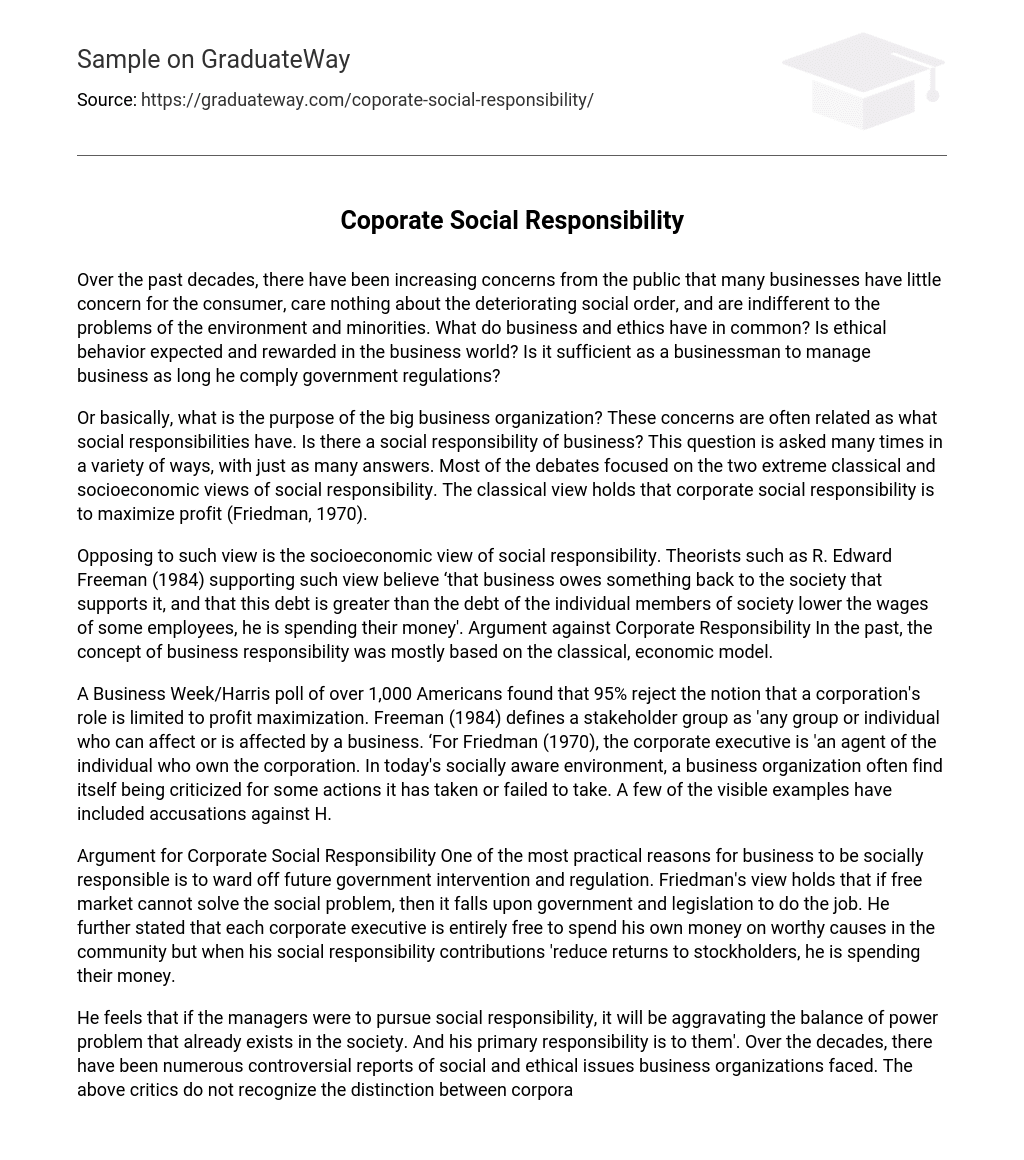Over the past decades, there have been increasing concerns from the public that many businesses have little concern for the consumer, care nothing about the deteriorating social order, and are indifferent to the problems of the environment and minorities. What do business and ethics have in common? Is ethical behavior expected and rewarded in the business world? Is it sufficient as a businessman to manage business as long he comply government regulations?
Or basically, what is the purpose of the big business organization? These concerns are often related as what social responsibilities have. Is there a social responsibility of business? This question is asked many times in a variety of ways, with just as many answers. Most of the debates focused on the two extreme classical and socioeconomic views of social responsibility. The classical view holds that corporate social responsibility is to maximize profit (Friedman, 1970).
Opposing to such view is the socioeconomic view of social responsibility. Theorists such as R. Edward Freeman (1984) supporting such view believe ‘that business owes something back to the society that supports it, and that this debt is greater than the debt of the individual members of society lower the wages of some employees, he is spending their money’. Argument against Corporate Responsibility In the past, the concept of business responsibility was mostly based on the classical, economic model.
A Business Week/Harris poll of over 1,000 Americans found that 95% reject the notion that a corporation’s role is limited to profit maximization. Freeman (1984) defines a stakeholder group as ‘any group or individual who can affect or is affected by a business. ‘For Friedman (1970), the corporate executive is ‘an agent of the individual who own the corporation. In today’s socially aware environment, a business organization often find itself being criticized for some actions it has taken or failed to take. A few of the visible examples have included accusations against H.
Argument for Corporate Social Responsibility One of the most practical reasons for business to be socially responsible is to ward off future government intervention and regulation. Friedman’s view holds that if free market cannot solve the social problem, then it falls upon government and legislation to do the job. He further stated that each corporate executive is entirely free to spend his own money on worthy causes in the community but when his social responsibility contributions ‘reduce returns to stockholders, he is spending their money.
He feels that if the managers were to pursue social responsibility, it will be aggravating the balance of power problem that already exists in the society. And his primary responsibility is to them’. Over the decades, there have been numerous controversial reports of social and ethical issues business organizations faced. The above critics do not recognize the distinction between corporate social responsibility and corporate governance. Because of their scale and visibility, large organizations are all ways in the eye of the media, whether it is in the newspapers or even on T.
V, which takes an interest in the way that organizations do business and the broad social outcomes of their activities. This is true of both government departments and private-sector organizations. Modern management of the large organization is keen to show itself to be socially responsible. In many cases, positive outcomes for society at large are included in an organization’s objectives. For example, Coles Myer has a Code of Conduct and a corporate social responsibility policy.
The company is a signatory to the National Retailers/TCFUA Ethical Clothing Code of Practice which aims to protect Australian clothing outworkers from exploitation. The company has also stated in the past that it will not buy carpets and rugs from manufacturers who use child labor. However, given the significant proportion of clothing and other goods the company sources from countries such as China, it would be reasonable to expect the company to have gone further in ensuring that all the offshore workers producing its goods are not subject to human rights abuses.





